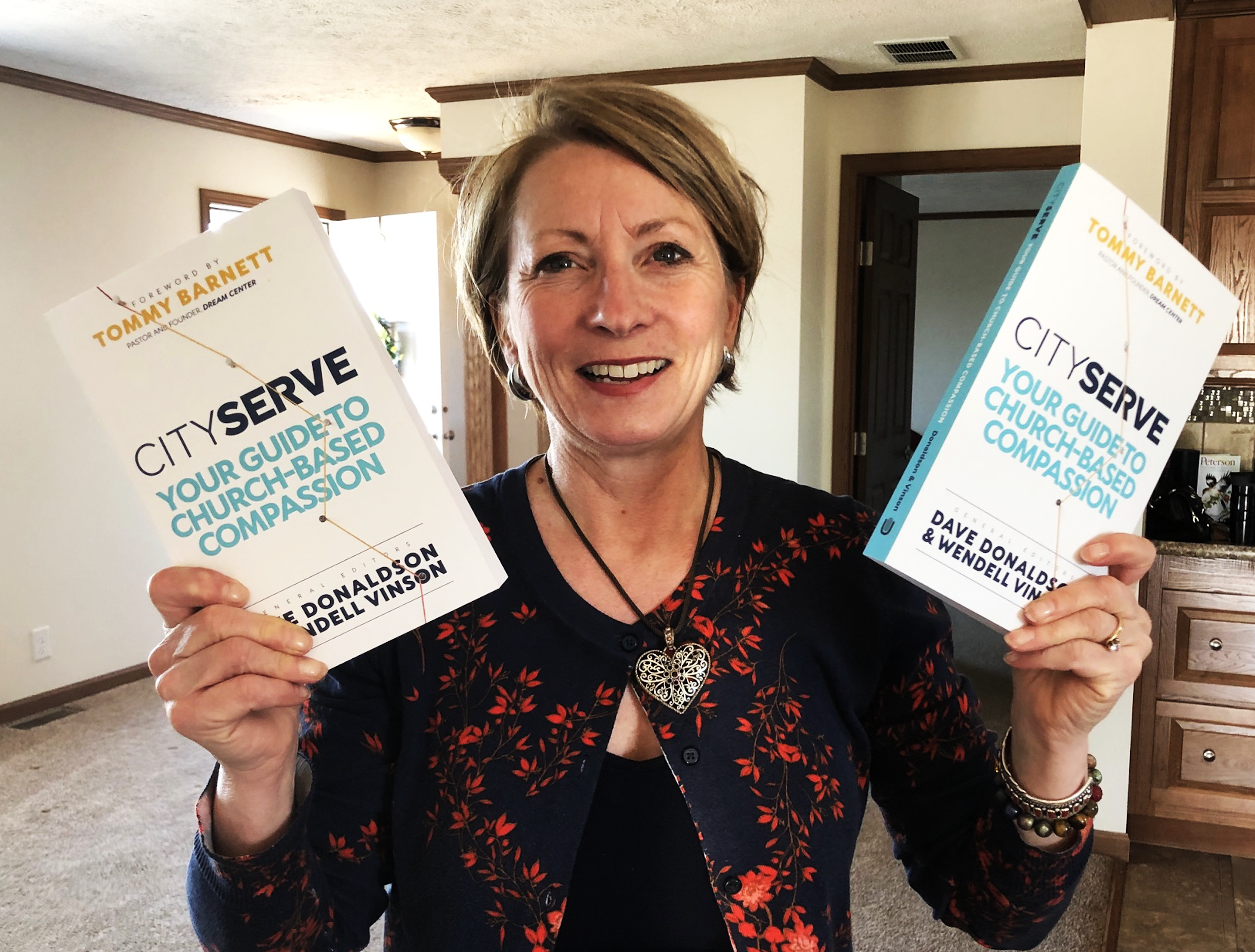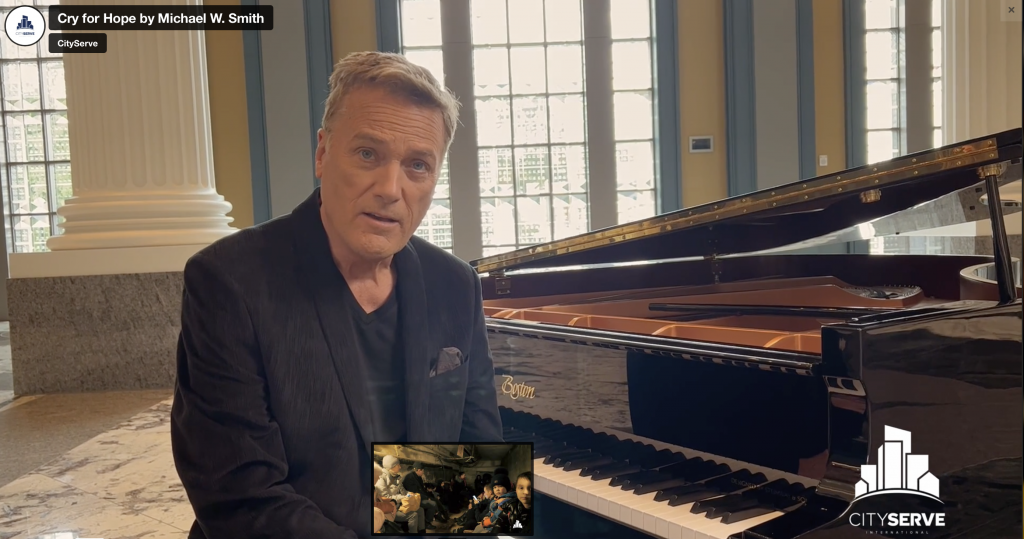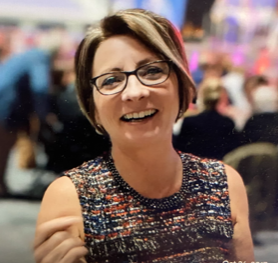
Need Leadership Development Insight to Generate a Positive Impact with Next Gen?
In a recent leadership development article, I spotlighted the work of CityServe, bringing relief and aid to millions of people displaced by the Russian-Ukrainian conflict.
Dave Donaldson, Co-founder and chairman of CityServe, stopped by our home in North Dakota last week for a short visit. He was excited about the collaborative work with Michael W. Smith.
Michael wrote “Cry For Hope” an inspirational instrumental to help Ukrainian people through CityServe International and its network of churches. I believe you’ll be deeply moved by this God-inspired music. Listen here. Watch here.
Dave has invested his life in global leadership development by inspiring, equipping, and resourcing leaders in more than 100 countries to bring aid and opportunity to tens of millions of needy and under-resourced people….including the Ukraine.
In 2019, Dave invited me to write a chapter for CityServe: Your Church-based Guide to Compassion. Co-authored with Wendell Vinson, the book includes forty leading experts in community-based and global compassion.
At the time of writing my contribution for this book, I focused on Millennials. However, Gen Z’s are already entering the leadership arena, and the insights in this chapter are equally important for them. And, they are equally important as they were before the Covid Craziness.
All up-and-coming leaders need your guidance. Your leadership matters, NOW, more than ever.
I hope this excerpt from Your Guide to Church-Based Compassion, inspires and energizes you to expand your leadership development efforts and influence. Find the future leader in your community who needs your guidance and coaching.
Updated Chapter 33: Millennials Making a Difference
“When non-profit leaders discuss the millennial generation, we either hear glowing praise or intense frustration, rarely anything in between. Dennis Thum, the chaplain at the University of Sioux Falls, gave me this analogy. ‘I think of it as a camel. When you interact with the first hump, you see impressive, emerging leaders who give you great hope for the future of the world. Then when you talk with those from the second hump, you see young people who appear to be lost, without hope.’
Look at the popular “stats and facts” you’ll find on Google when you search for anything relating to Millennials:
- Born between 1980 and the mid-2000s they’ll comprise more than 50 percent of the workforce by 2020.7
- The 2017 Bloomberg article “A Quarter of Millennials Who Live at Home Don’t Work—or Study” reveals that approximately 33 percent of 18- to 34-year-olds live at home or in college dormitories, and of those 25- to 34-year-olds who live with their parents, 25 percent neither work nor are enrolled in school—that’s 2.2 million Millennials in the United States.8
- In the 2016 Inc.com article “29 Surprising Facts That Explain Why Millennials See the World Differently,” author Gordon Tredgold presented statistics to help us understand what drives this generation.
- 54% either want to start a business or already have
- 74% want flexible work schedules
- 84% say that helping to make a positive difference in the world is more important than professional recognition
- 88% prefer a collaborative work culture rather than a competitive one
- 92% believe that business success should be measured by more than just profit9
How to Manage Millennials
In a recent survey, our company conducted its own study and asked leaders to list all the frustrations they experience in working with Millennials. Over 270 responded. Of those, 60 percent said they have deep concerns about how to work with this generation.
The top three response categories were:
- character traits (45 percent)
- confidence (34 percent)
- collaboration (21 percent)
Their strongest complaints were:
- lack of determination and resiliency,
- lack of accountability,
- a know-it-all attitude, and
- disregard for the value of work.
To complete the picture, let’s not forget about the stereotypes: entitled, lazy, self-interested, narcissistic, job-hopping, addicted to technology, unfocused, craving instant gratification, disloyal, impatient, difficult to manage, restless . . .
This is the millennial generation.
Or is it?
You can choose to jump on the bandwagon, become frustrated, anxious, and even sad about this generation, or you can choose to focus on the positive.
When you think of how to manage Millennials in your sphere of influence, what do you see? Do you see the up-and-coming leaders from the first hump of the camel, the emerging leaders who give you great hope for the future? Or do you see young people who are from the second hump? Those who are struggling to find their way in our fast-paced, sometimes chaotic world? Either way, you have a stewardship responsibility to prepare them to meet the challenges of the future.
As a mother of three Millennials, I choose to celebrate and embrace this generation. I believe that to ensure vibrant, thriving compassion ministry growth we need to tap the myriad of unique skills, talents, and strengths Millennials bring to our organizations.
Why and How Should We Involve Millennials in Compassion Ministries?
Why should a church or compassion ministry consider hiring Millennials? And if they do, how can they develop these emerging leaders for compassion work?
Here are some things to consider:
- The Collaboration Generation. Many people believe that Millennials are expert collaborators. After all, they’ve been working in teams since first grade. They have digital technology at their fingertips, so they can collaborate on a global scale in a matter of seconds. And yes, many of them know the importance of really listening and valuing others so that synergistic collaboration happens.
It would be wise though to keep in mind that some emerging leaders haven’t had enough working experience to know how to function in a true collaboration.
- Break the Collaboration Stereotypes. Are they addicted to their technology? Then use it to your advantage. Your millennial leader’s affinity with the digital world is one of the defining characteristics of their generation. They have a better grasp of these key business tools than more senior workers. Who better to rally their vast networks to further your cause or to spread the word on your compassion project?
- Strengthen Their Collaboration. Based on my personal experience with young leaders, Millennials welcome mentoring and coaching from people they respect. They want to work with honest, authentic leaders; favor a trusting, transparent relationship with their superiors; and work best with clear guidelines and frequent feedback. This mindset will make your job that much easier when you mentor them on the best way to collaborate on your project.
- Beware of the Confidence Crushers. Some millennial leaders struggle to connect what they’re doing today with what they want to be doing in the future. They can become disheartened and have their confidence shaken. Under these circumstances, emerging leaders might think the best solution is to find another job or project.
Emerging leaders want to have meaning and purpose at work, but they experience a misalignment with their gifts and talents. Because they’re not operating in their sweet spot, they feel they’re not getting anywhere.
An emerging leader I’m coaching told me, “As much as Millennials are eager to give back and help others, we’re all different in our own way. Getting to know each person and how they work is the strongest tool a leader can have.”
I learned about an ancient Hebrew word in my transformational leadership studies at Bethel Seminary. This word is used for both work and worship: Avodah. Having one word for such different meanings really caused me to think. Historically, our Western culture has divided life into secular and sacred: Work is secular; purpose and meaning are spiritual. Millennials want purpose and meaning in their everyday lives but don’t know how to bring that about. They feel left in the dark.
Experienced business leaders can teach next-gen leaders that how they do their “ordinary” work becomes “extraordinary” when they see it as a way to honor God and serve their clients and colleagues.
The YouTube video “Work as Worship” by RightNow Media is a great summary of the struggle between what is regarded as work and what has spiritual meaning. Where is the dividing line? This resource helps Millennials as they seek out the purpose of their own lives and try to understand how they can be a light in their current work environment.
By coaching and mentoring your up-and-coming leaders to build a center of courageous character strength, you provide a firm footing so they can have a positive influence in your compassion work.
- Break the Character Stereotypes. Self-absorbed, disloyal, and entitled? Might we consider it our privilege and, in fact, our calling, to mentor and coach our emerging leaders on the sensitive subject of character? A word of warning—you’ll almost certainly be challenged by your millennial leaders. This is what one of the young reviewers of Millennials Matter had to say:
Millennials often see leaders from the previous generation as the single bottom-line thinkers that justified false advertising, pollution, factory farming, and human rights violations. We see them as having lost much of their credibility when it comes to talking about the right thing to do.
By openly sharing our own stories of success and failure, we can make it easier for our millennial leaders to look inside themselves and find the areas where they need to change.
Millennials are often described as a “hopeful” generation. But being hopeful doesn’t guarantee they’ll be able to deal with obstacles and rebound quickly. Their hopeful mindset is often linked to their ability to dream big and to expect they can get whatever they want from life. That can be a great mindset to have—if it goes hand in hand with the reality of what it takes to achieve those dreams. This reality calls for intense resilience, the grim, gritty, white-knuckle form of courage that is typically presented in situations where success is against the odds.
Do you think the emerging leaders in your sphere of influence are equipped to deal with the challenges they’ll face in your compassion work?

I agree – leadership development isn’t easy. However, I believe that you can expand your leadership development efforts by using your skills, experience, and wisdom to build future leaders for the future.
I invite you to remain committed to discovering the best way to develop character-based leaders with strong personal and moral responsibility.
Your leadership matters, NOW, more than ever.
Get the previous articles in this series here.
Leadership Development Lesson: As you commit to building character-based leaders for the future who are resilient and mentally tough, it is even more important to strengthen your leadership development strategies.
Leadership Development Question: What is your biggest challenge in creating a leadership development strategy for today’s culture?
Let’s discuss a tailor-made talk to meet your specific needs.
Virtual speaking event? No problem!
Check out my Speaker page HERE.
To schedule, a call contact me at danita@danitabye.com





No Comments